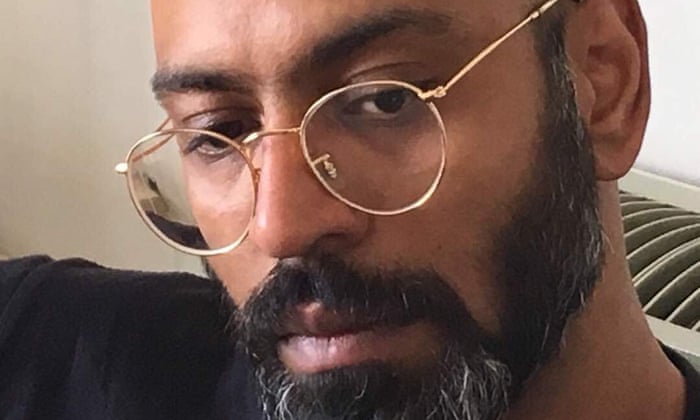
Ehsan Abdollahi has got no right of appeal to contest denial of a visa for Britain. Photograph: Handout
An acclaimed Iranian illustrator has been denied a visa to attend the Edinburgh international book festival amid growing criticism of the UK’s handling of Iranian visas.
Ehsan Abdollahi, described by the festival’s director as a “highly respected, award-winning Iranian illustrator of kids’ books”, was due to arrive in the UK early August, but he has received a visa refusal letter, issued by the British embassy in Dubai and seen by the Guardian. It states that he has “no right of appeal or right to administrative review”.
Abdollahi, 37, who teaches at Tehran’s top Honar (Art) University, has illustrated a number of children’s books published in English by Tiny Owl, including When I Coloured in the World, by one of Iran’s best-known living poets, Ahmadreza Ahmadi.
The independent publishing house has introduced Persian books for children in English, including The Little Black Fish, the most famous Iranian story for children written by Samad Behrangi and illustrated by Farshid Mesghali, winner of the Hans Christian Andersen award.
Delaram Ghanimifard, of Tiny Owl, said she was incredibly disappointed that Abdollahi’s visa had been denied, saying it was the third consecutive year that Iranian authors and illustrators of children’s books had been denied UK entry to attend book festivals.
“He will be very much missed this summer,” she said. “Ehsan’s books, When I Coloured in the World, and A Bottle of Happiness, offer unique visual perspectives which represent the wonderful diversity of the world we live in. We believe that books help us to understand other cultures and it is a great shame that children in the UK are being denied this access.”
Abdollahi, speaking to the Guardian by phone from Tehran, said he was upset by the decision. “It would be a lie if I say I didn’t get upset,” he said. “I had planned for it for months. They have given very ridiculous reasons for rejecting the visa despite me having provided all the necessary documents.”
Although London and Tehran have improved bilateral ties, the UK has significantly tightened up its visa issuance to Iranians, which is seen as a de facto travel ban on par with the one imposed by the US president, Donald Trump.
The British embassy in Tehran offers few if any visa appointments. The Guardian has received several complaints by Iranian applicants in recent months alleging corruption in the visa appointment system.
Abdollahi had to go to Dubai to apply for the visa. He said one reason for the refusal was that he was single. “Since when being a single person has become a crime?” he asked.
The visa refusal letter says: “You have submitted a bank balance statement from Tejarat Bank with a latest balance of IRR 679,529,024 (£16,124). However it is not clear where these funds originate from. As such, without evidence of the origin of this money, I am not satisfied that it is genuinely yours and available to fund the proposed visit. I note you are divorced and no one is dependent on you.”
Such scrutiny of ordinary bank statements is seen by Iranian applicants as an excuse to deny visas when they have provided sufficient documents.
Abdollahi said the reasons he had received were Kafkaesque. “I had submitted documents including my payslip and my work contract, and it is normal that I would have some savings – I have worked as an illustrator since I was 18.”
Nick Barley, the director of the Edinburgh international book festival and chair of the Man Booker international prize 2017, took to Twitter to express outrage at the decision. “Why is UK government denying @edbookfest visas to Iranian authors for 3rd year in a row?” he said in a series of tweets protesting about the decision. The Twitter hashtag #VisaforAbdollahi has been used by others online to express dismay.
“British culture will be damaged if ambitious publishers like @TinyOwl_Books can’t bring their international authors to book festivals,” Barley said. “Honestly, in what way is this book a threat to British security … How can we combat stereotypes and reduce prejudice in UK if author visas are denied?”
A Home Office spokesperson said: “We do not routinely comment on individual cases. All visa applications are considered on their individual merits, and applicants must provide evidence to show they meet the requirements of the immigration rules.”
Ghanimifard said: “Contemporary works of authors and artists are often lost in the crossfire of politics and negative news.”
In 2016, Marjan Vafaian, the illustrator of the Tiny Owl titles Bijan and Manije and The Parrot and the Merchant, had to cancel events in Edinburgh and London after being refused a visa. “In 2015, an application was declined for Ali Seidabadi, author of A Rainbow in my Pocket, and Tiny Owl’s Persian editor, meaning that he too had to pull out of similar events,” she said.
According to the Bookseller, other publishers, including Comma Press and Saqi Books, have faced dilemmas with visas for authors in similar scenarios described as “bureaucratic traps” and “Kafkaesque potholes”.
In reaction to his visa refusal, Abdollahi drew an illustration which was posted online. It shows an animated Abdollahi in a bottle in reference to his book, A Bottle of Happiness, along with the words painted in colours: “I rubbed out the words ‘No Entry’ and wrote with all my colours: Happiness, Flying, Kindness, Hope, Love.”
He later told the Guardian: “I was meant to be the jin in the bottle for the kids in the festival, the bottle is the symbol of happiness, but then after the visa refusal I realised it has become a bottle of despair, so I drew that. It carries a message of peace.”
[“Source-theguardian”]












